Popular on Food52
19 Comments
Monica B.
November 16, 2016
Yes, RINSE ! I rinse my grains for at least one minute, or until the water runs clear. Rice has arsenic in it. Washing helps. Organic, California rice is the cleanest. Quinoa MUST be washed. The saponins are toxic. I wash all whole grains. If I don't nurture my foods while preparing them, and before eating them, who will ???
NuMystic
November 16, 2016
As already noted in my post below saponins are no longer an issue for commercially distributed Quinoa in the US! Stop spreading this misinformation please! This is a vestige from a time when it used to be true but these days the saponins are already polished from quinoa during processing long before it hits our shelves.
Those of us who have been using Quinoa for a very long time remember the days when rinsing was a necessity, it's been ages since that was true.
Try without rinsing now and you'll find that there is absolutely no bitter or soapy flavor which was the hallmark of the old saponin laden Quinoa of years gone by.
Now you can just toss the dry quinoa in a dry pot over high heat and toast it until it's a nice golden color which bestows a delicious nutty flavor you cannot achieve any other way.
Please spread the word so everyone will stop propagating this outdated myth.
After the first time you pan toast your quinoa you'll never go back!
Those of us who have been using Quinoa for a very long time remember the days when rinsing was a necessity, it's been ages since that was true.
Try without rinsing now and you'll find that there is absolutely no bitter or soapy flavor which was the hallmark of the old saponin laden Quinoa of years gone by.
Now you can just toss the dry quinoa in a dry pot over high heat and toast it until it's a nice golden color which bestows a delicious nutty flavor you cannot achieve any other way.
Please spread the word so everyone will stop propagating this outdated myth.
After the first time you pan toast your quinoa you'll never go back!
Michele J.
July 19, 2015
In the current issue of Edible Orange County you can find my current article, The One Minute Rice Meditation. It is an overview of how - and why - it is so necessary to rinse rice, especially here in the United States, where in many regions rice has been exposed to arsenic. Here's the link; you can the article on page 24. I hope that you enjoy it! http://www.magazooms.com/HTML5/Edible-Orange-County-Spring-2015
nitya
April 14, 2014
In india we generally have the habit of rinsing all the grains and lentils.I remember,mom would be very particular about the rinsing part when were learning to cook. In the case of certain lentils and legumes it is also believed that if they are rinsed before cooking then, they are easily digested.
Kt4
April 14, 2014
Not long ago I had a conversation about the whens and whys of rinsing rice and was told to never rinse "enriched" rice because it will remove the added nutrition.
Michele J.
April 14, 2014
This is true for enriched white rice, as the vitamins are literally sprayed on! If you rinsed it, the vitamins would go down the drain, so the manufacturers delete that step from the directions. Regardless, enriched white rice is a highly processed food. Stick with whole grains and be sure to rinse them.
Michele J.
April 14, 2014
Rinsing rice (this is even more important for brown rice) 3-4 times prior to starting the cooking process is important to reduce the arsenic content. See http://www.nutritionprescription.biz/3/post/2013/05/rice-from-brown-to-basmati.html
NuMystic
April 13, 2014
Using Red Quinoa from Trader Joe's, Eden Organic, Ancient Harvest, and various bulk bins over the last 5 years we've never once had even a hint of bitterness without washing and just pan toasting as outlined below.
Francesca
April 13, 2014
It is also necessary to rinse and soak Basmati rice, despite all the supposed cleaning that goes on. It is a step in the cooking to making perfect rice. I wash Quinoa, especially the red stuff, as it is really bitter. Barley also needs a rinse and soak.
NuMystic
April 13, 2014
"While most quinoa sold in the US is washed and well-processed, it's still a safer bet to rinse it before cooking."
There is no reason to play it "safe" by washing Quinoa here in the US any longer, and at least one great reason not to.
While it's true that those of us who have been using Quinoa for a very long time remember the days when rinsing was a necessity, it's been ages since that was true.
We source our Quinoa from a ton of different places as we make it 2-3 times a week on average and haven't come across bitter saponin laden quinoa even once in the last 5 years.
The benefit to not washing is being able to just toss the dry quinoa in a dry pot over high heat and toast it until it's darkened a few shades to a nice golden color which unlocks a deliciously nutty flavor you cannot achieve any other way.
Say no to needless Quinoa washing and please spread the word so everyone will stop propagating this outdated myth. After the first time you pan toast your quinoa you'll never go back!
There is no reason to play it "safe" by washing Quinoa here in the US any longer, and at least one great reason not to.
While it's true that those of us who have been using Quinoa for a very long time remember the days when rinsing was a necessity, it's been ages since that was true.
We source our Quinoa from a ton of different places as we make it 2-3 times a week on average and haven't come across bitter saponin laden quinoa even once in the last 5 years.
The benefit to not washing is being able to just toss the dry quinoa in a dry pot over high heat and toast it until it's darkened a few shades to a nice golden color which unlocks a deliciously nutty flavor you cannot achieve any other way.
Say no to needless Quinoa washing and please spread the word so everyone will stop propagating this outdated myth. After the first time you pan toast your quinoa you'll never go back!
Kathy M.
April 13, 2014
Once you start rinsing your grains, you realize just how dirty they are -- and that helps give you the incentive to keep doing it! :-)
rs12
July 26, 2017
Think whole wheat flour. Ready to use. No washing required.
Yet if we buy the grain kernals, they need washing?
Very strange.
So if you say to wash all grains, shall we buy unmilled wheat, wash it, dry it, then grind it in our own mill?
Or, if the ready-milled flour is from grains washed and dried before milling, then why can't we buy such pre-washed dried grains, including rice?
Yet if we buy the grain kernals, they need washing?
Very strange.
So if you say to wash all grains, shall we buy unmilled wheat, wash it, dry it, then grind it in our own mill?
Or, if the ready-milled flour is from grains washed and dried before milling, then why can't we buy such pre-washed dried grains, including rice?
valerie S.
April 10, 2014
I've gone one better, soaking my quinoa overnight with a tablespoon of an acid medium (yogurt, kefir or lemon juice) in the soaking water. the result is an almost delicate cooked grain without the bitterness.
Soaking tips,
http://www.thenourishinggourmet.com/2012/01/basic-quinoa-soaked.html
Soaking tips,
http://www.thenourishinggourmet.com/2012/01/basic-quinoa-soaked.html
Ivy H.
April 10, 2014
Growing up in an Asian family, I've seen my mother rinse the rice thoroughly, before steaming, every since I was a child. Naturally, I came to do the same for all of my rice (mostly sushi rice, jasmine rice, brown rice). It's actually quite amazing how much debris/powder coating there is at times! My mother usually rinses the rice 2-3 times, so I do the same. After all, don't mothers know best?
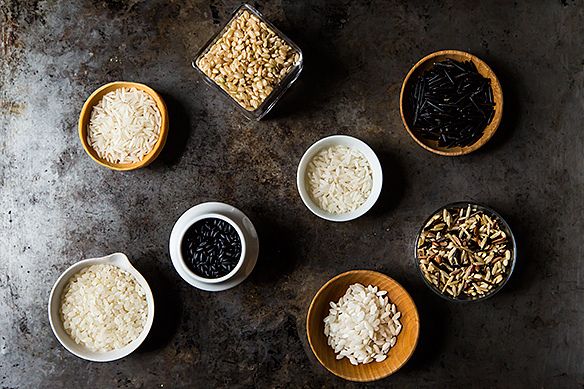
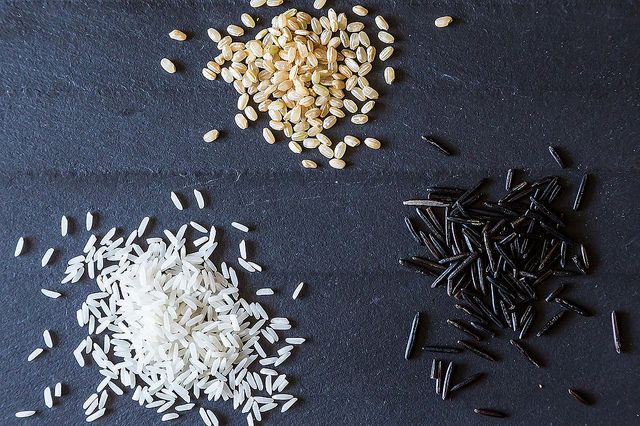
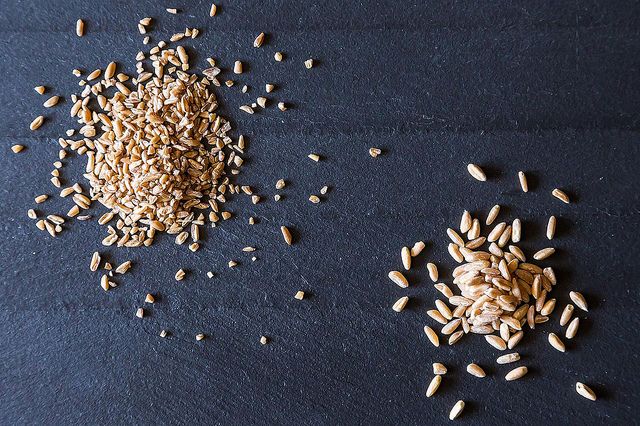
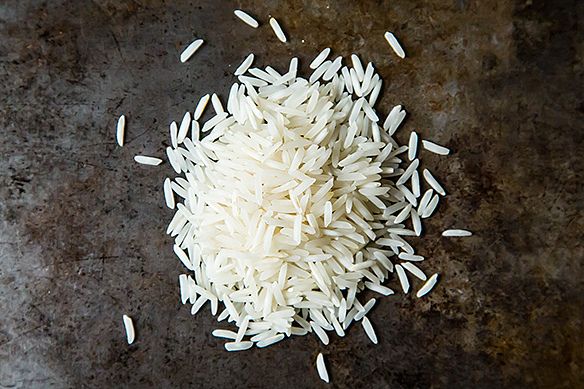
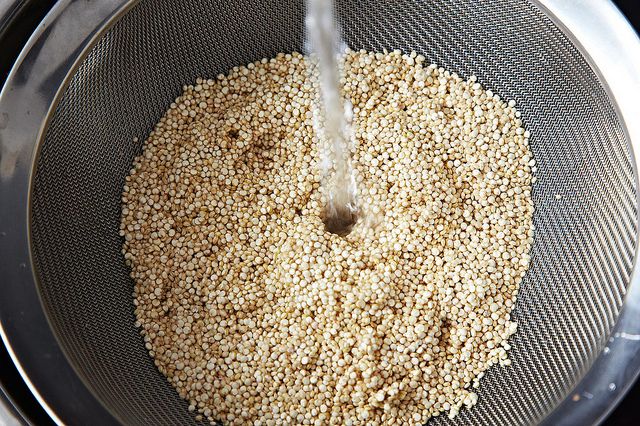

See what other Food52 readers are saying.